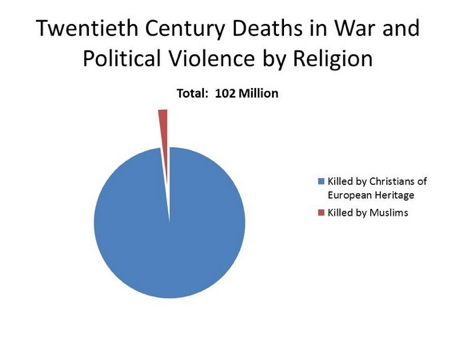1. Not all Muslims are Arabs
In fact, according to the most acknowledged statistics, the number of Muslims around the world amounts to an estimated 1.56 billion people, compared to estimated 2.2 billion Christians and 14 million Jews.
Of this total, Arab countries are home to around 380 million people, that is only about 24 per cent of all Muslims.
2. Not all Arabs are Muslims
While Islam is the religion of the majority of Arab population, not all Arabs are Muslims.
In fact, it is estimated that Christians represent between 15 per cent and 20 per cent of the Arab combined population. Therefore, Arab Muslims amount to just around one-fifth of all the world’s Muslims.
Arab Christians are concentrated mainly in the Palestinian Territories, Lebanon and Egypt, where they represent up to 13 per cent of the total population amounting to 95 million inhabitants according to last year’s census.
It is also estimated that there are more Muslims in the United Kingdom than in Lebanon, and more Muslims in China than in Syria.
3. Major Muslim countries are Arab
According to the U.S-based Pew Research Center, the percentage of major religious groups in 2012 was: Christianity 31.5 per cent; Islam 23.2 per cent; Hinduism 15.0 per cent, and Buddhism 7.1 per cent of the world’s total population.
Meanwhile, the Pew Research Center estimated that in 2010 there were 49 Muslim-majority countries.
South and Southeast Asia would account for around 62 per cent of the world’s Muslims.
According to these estimates, the largest Muslim population in a single country lives in Indonesia, which is home to 12.7 per cent of all world’s Muslims.
Pakistan (with 11.0 per cent of all Muslims) is the second largest Muslim-majority nation, followed by India (10.9 per cent), and Bangladesh (9.2 per cent).
The Pew Research Center estimates that about 20 per cent of Muslims live in Arab countries, and that two non-Arab countries – Turkey and Iran – are the largest Muslim-majority nations in the Middle East.
In short, a large number of Muslim majority countries are not Arabs. This is the case of Afghanistan, Bangladesh, Iran, Indonesia, Pakistan and Turkey.
4. Muslims do not have their own God
“Allah” is the Arabic word for God. It is the word used by Arabic-speaking Christians and is related to the Hebrew words “Elohim” and “Eloha” which are used in the Jewish scripture. in his native language, Aramaic, Jesus called God “Eleha”
In addition, Islam does not at all deny the existence of Christianity or Christ. And it does fully recognise and pay due respect to the Torah and the Gospels.
The main difference is that Islam considers Christ as God’s closest and most beloved “prophet,” not his son.
5. Islamic “traditions”
Islam landed in the 7th century in the Gulf or Arab Peninsula deserts. There, both men and women used to cover their faces and heads to protect themselves from the strong heat and sand storms. It is not, therefore, a purely Islam religious imposition.
Meanwhile, in the Arab deserts, populations used to have nomadic life, with men travelling in caravans, while women and the elderly would handle the daily life of their families.
Female genital modifications are found in a minority of Islamic societies and are also found in some Christian societies and many African tribal societies. In all cases, they are cultural, not religious in origin.
Likewise other major monotheistic religions, a number of Muslim leaders have used faith to increase their influence and power. This is fundamentally why so many “new traditions” have been gradually imposed on Muslims. This is the case, for example, of denying the right of women to education.
As with other major monotheistic religions, some Muslim leaders used their ever growing powers to promote inhuman, brutal actions. This is the case of “ radical jihad” fundamentalists, like Daesh (ISIL), Boko Haram, and al-Qaeda–which have been denounced by orthodox Muslims as heretical groups.
This has not been an exclusive case of Muslims along the history of humankind. Just remember the Spanish-Portuguese invasion of Latin America, where indigenous populations were exterminated and Christianity imposed by the sword, for the sake of the glory of Kings, Emperors… and Popes.
6. The unfinished wars between the West and Islam (and vice-versa)
There is a growing belief among some Arab and Muslim academicians that the ongoing violent conflicts between Muslims and the West (and vice-versa) are due to the “unfinished” war between the Christian West and the Islamic Ottoman Empire, in spite of the fact that the latter was dismantled in the early 1920s.
This theory is used to explain the successive wars in the Balkans and the Middle East, for instance. The latter conflicts, in fact, are the result of the Western colonization and occupation of the Middle East.
7. The “religion” of oil
It has become too common to say that oil producers are predominantly Arabs and Muslims. This is not accurate.
To start with, the Organization of the Petroleum Exporting Countries (OPEC) was founded in (the under British mandate) Baghdad, Iraq, in 1960 by five countries: Iran, Iraq, Kuwait, Saudi Arabia and Venezuela. These were later joined by Qatar (1961), Indonesia (1962), Libya (1962), the United Arab Emirates (1967), Algeria (1969), Nigeria (1971), Ecuador (1973), Gabon (1975) and Angola (2007).
And here you are: OPEC full membership includes: Ecuador, Venezuela, Nigeria, Gabon and Angola. None of these is either Arab or Muslim. They are all Christian states. As for Iran and Indonesia, these are Muslim countries, but not Arab.
Then you have other major oil and gas producers and exporters outside the OPEC ranks: the United States [which produces more oil (13,973,000 barrels per day) than Saudi Arabia (11,624,000)]; Russia (10,853,000); China (4,572,000); Canada (4,383,000, more than United Arab Emirates or Iran or Iraq); Norway (1,904,000, more than Algeria) and Mexico, among others.
Again, none of these oil producers is Arab or Muslim. »»» Informed Comment
Go to article…



